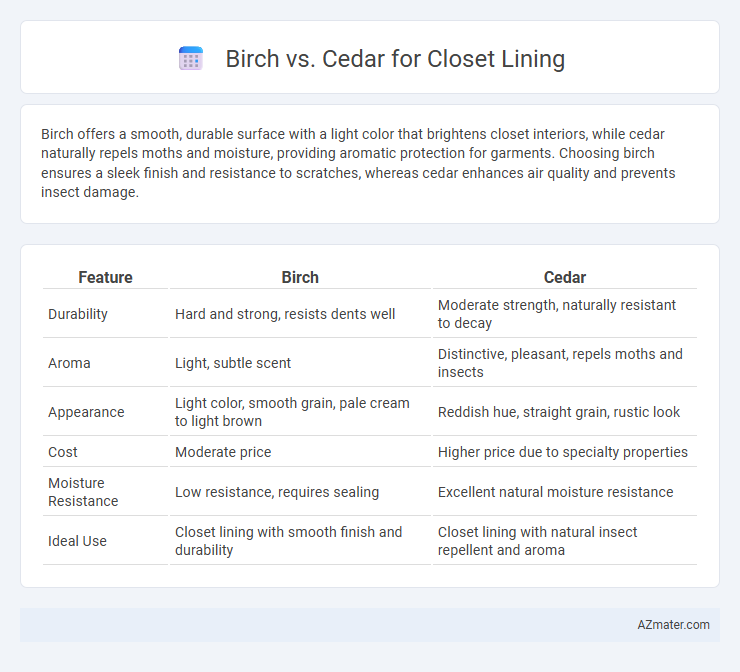Birch offers a smooth, durable surface with a light color that brightens closet interiors, while cedar naturally repels moths and moisture, providing aromatic protection for garments. Choosing birch ensures a sleek finish and resistance to scratches, whereas cedar enhances air quality and prevents insect damage.
Table of Comparison
| Feature | Birch | Cedar |
|---|---|---|
| Durability | Hard and strong, resists dents well | Moderate strength, naturally resistant to decay |
| Aroma | Light, subtle scent | Distinctive, pleasant, repels moths and insects |
| Appearance | Light color, smooth grain, pale cream to light brown | Reddish hue, straight grain, rustic look |
| Cost | Moderate price | Higher price due to specialty properties |
| Moisture Resistance | Low resistance, requires sealing | Excellent natural moisture resistance |
| Ideal Use | Closet lining with smooth finish and durability | Closet lining with natural insect repellent and aroma |
Introduction to Birch and Cedar for Closet Lining
Birch and cedar are popular choices for closet lining due to their unique properties and benefits. Birch offers a smooth, sturdy surface with a light color that enhances closet aesthetics and resists warping. Cedar is prized for its natural aromatic oils that repel insects and moisture, making it ideal for preserving clothing and preventing mold growth.
Key Properties of Birch Wood
Birch wood is preferred for closet lining due to its fine grain, smooth texture, and high durability, providing a sleek and polished finish. Its light color enhances closet brightness and complements various interior styles, while its resistance to wear and moderate moisture makes it ideal for long-lasting use. Birch also offers excellent stability, minimizing warping or shrinking in fluctuating closet environments.
Key Properties of Cedar Wood
Cedar wood is valued for its natural resistance to moisture, insects, and decay, making it an ideal choice for closet lining. Its aromatic properties help repel moths and other pests, preserving clothing and textiles inside closets. Compared to birch, cedar's durability and distinct pleasant scent enhance closet environments by providing both protection and freshness.
Aromatic Benefits: Cedar vs Birch
Cedar closet lining offers strong aromatic benefits due to its natural oils, which repel moths and other insects while providing a distinctive, pleasant scent that helps freshen clothing storage. Birch, while less aromatic, has a subtle, clean fragrance but lacks the insect-repelling properties found in cedar. Choosing cedar enhances closet environment by combining natural fragrance with protective qualities, making it superior in terms of aromatic benefits compared to birch.
Resistance to Moisture and Pests
Birch closet lining offers moderate resistance to moisture but is more vulnerable to pest infestations compared to cedar, which naturally repels insects and prevents mold growth due to its aromatic oils. Cedar's superior resistance to both moisture and pests makes it an ideal choice for closet environments where humidity and insect presence are concerns. Opting for cedar lining can extend the longevity of stored clothing and textiles by reducing the risk of mildew and moth damage.
Durability and Longevity Comparison
Birch offers moderate durability with a smooth texture resistant to warping, making it suitable for closet lining in stable indoor environments. Cedar provides superior longevity due to its natural oils that resist moisture, insects, and mold, enhancing closet interior lifespan. While birch is cost-effective and visually appealing, cedar's inherent durability ensures prolonged protection and structural integrity in closet applications.
Cost Differences: Birch vs Cedar
Birch closet lining typically costs less than cedar, making it a budget-friendly option for many homeowners. Cedar wood is priced higher due to its natural aromatic oils and insect-repellent properties, which enhance durability and scent. Choosing birch offers savings upfront, while cedar provides long-term value through natural preservation and added closet protection.
Maintenance Requirements for Each Wood
Birch closet lining demands regular sealing and occasional sanding to maintain its smooth surface and prevent moisture damage. Cedar naturally resists insects and mildew, requiring minimal upkeep aside from occasional light sanding to refresh its aroma. Choosing cedar reduces long-term maintenance efforts while offering natural preservation benefits compared to birch.
Environmental Impact and Sustainability
Birch and cedar both offer sustainable options for closet lining, but birch is typically harvested from fast-growing forests, making it a more renewable resource with lower environmental impact. Cedar contains natural oils that resist pests and mold, reducing the need for chemical treatments and enhancing sustainability through longevity and low maintenance. Choosing FSC-certified birch or cedar ensures responsible forest management and supports eco-friendly closet lining solutions.
Choosing the Best Wood for Your Closet Lining
Birch offers a smooth, light-toned finish that enhances closet brightness and resists warping, making it ideal for a modern, clean look. Cedar is highly aromatic and naturally repels moths and insects, providing excellent protection for garments and adding a warm, reddish hue. When choosing the best wood for closet lining, prioritize cedar for its pest resistance and scent, while birch suits those seeking durability with a neutral aesthetic.

Infographic: Birch vs Cedar for Closet Lining
 azmater.com
azmater.com